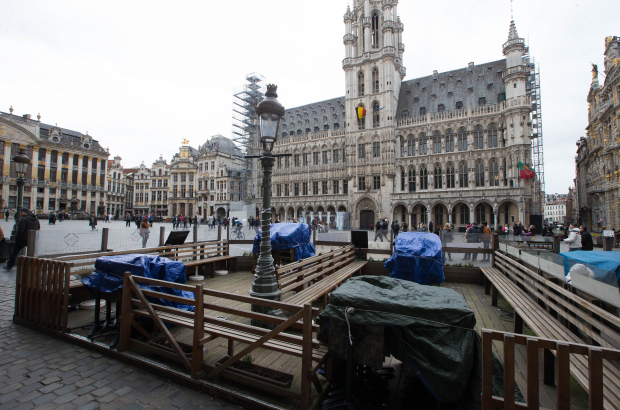- Daily & Weekly newsletters
- Buy & download The Bulletin
- Comment on our articles
Brussels tourism sector in peril after 'disastrous' summer
The Brussels tourism industry has suffered one of its worst summers on record as the ongoing health crisis, coupled with the terrible weather, has led to foreign tourists shunning the capital. As a result, representatives of the sector have called on the federal government to extend temporary unemployment measures.
"The tourist hub of Brussels has lost more than 70% of its turnover compared to the summer of 2019," before the coronavirus pandemic hit, according to Fabian Hermans, administrator of the Brussels Horeca Federation which represents the capital’s hospitality industry. "Brussels is empty of tourists, moribund, as if in an artificial coma. There are chairs as far as the eye can see but no customers sitting on them," he said. "It's a disaster."
The figures are similarly bleak for hotels in the city which rely mainly on foreign tourists to fill their rooms. "The occupancy rate for July and August is 25% and 28% respectively, compared to 79% and 68% in 2019," said Rodolphe Van Weyenbergh, secretary-general of the Brussels Hotels Association (BHA). "The situation is untenable. From the beginning of 2021 until the end of August, the cumulative decrease in turnover compared to the same period in 2019 is 80%."
The lack of foreign tourists in the capital is the main factor behind the drastic situation while the widespread uptake in remote working has severely reduced business trips. "Urban hotels are 80% dependent on international customers and business tourism," said Van Weyenbergh.
"Before working from home and remote meetings were the norm, business travellers filled hotels and enjoyed themselves in Brussels restaurants and bars. But today, companies limit their congresses and seminars to a minimum," Hermans added.
Meanwhile, Belgian tourists prefer to stay at the coast or in the Ardennes rather than in the capital.
In addition to the health crisis and its hazards, the bad weather over the summer has had a significant impact. "Between the reopening of restaurants on 8 May and 5 August, there were 78 consecutive rainy days, including 26 stormy days," Hermans lamented, citing figures from the Royal Meteorological Institute (RMI).
The outlook for September is no more encouraging. "The occupancy rate for the start of the school year varies between 8% and 10% against 20% in normal times," according to Van Weyenbergh.
"As long as the hospitality industry does not work, the region will be paralysed," said Hermans.
Disillusioned, the sector has been pleading with the federal economy minister Pierre-Yves Dermagne to extend the temporary unemployment measures, which cease at the end of September. "We are also asking for the coverage of hidden costs related to temporary unemployment such as the assimilated end-of-year bonus," Hermans said.
The sector is also turning to the Brussels region to quickly implement "the new regional premium for hotels".
Aware of the difficulties of the sector, representatives from the region will travel to Paris from 23 to 25 September in a bid to revive tourism and promote the capital of Europe as part of the "Brussels Days" promotional campaign. Organised every year since 2006, the travelling campaign has been suspended since the beginning of the health crisis. "It is very symbolic to start the missions abroad again with Paris as the French are the main target audience of the capital," commented the office of the minister-president Rudi Vervoort.



















